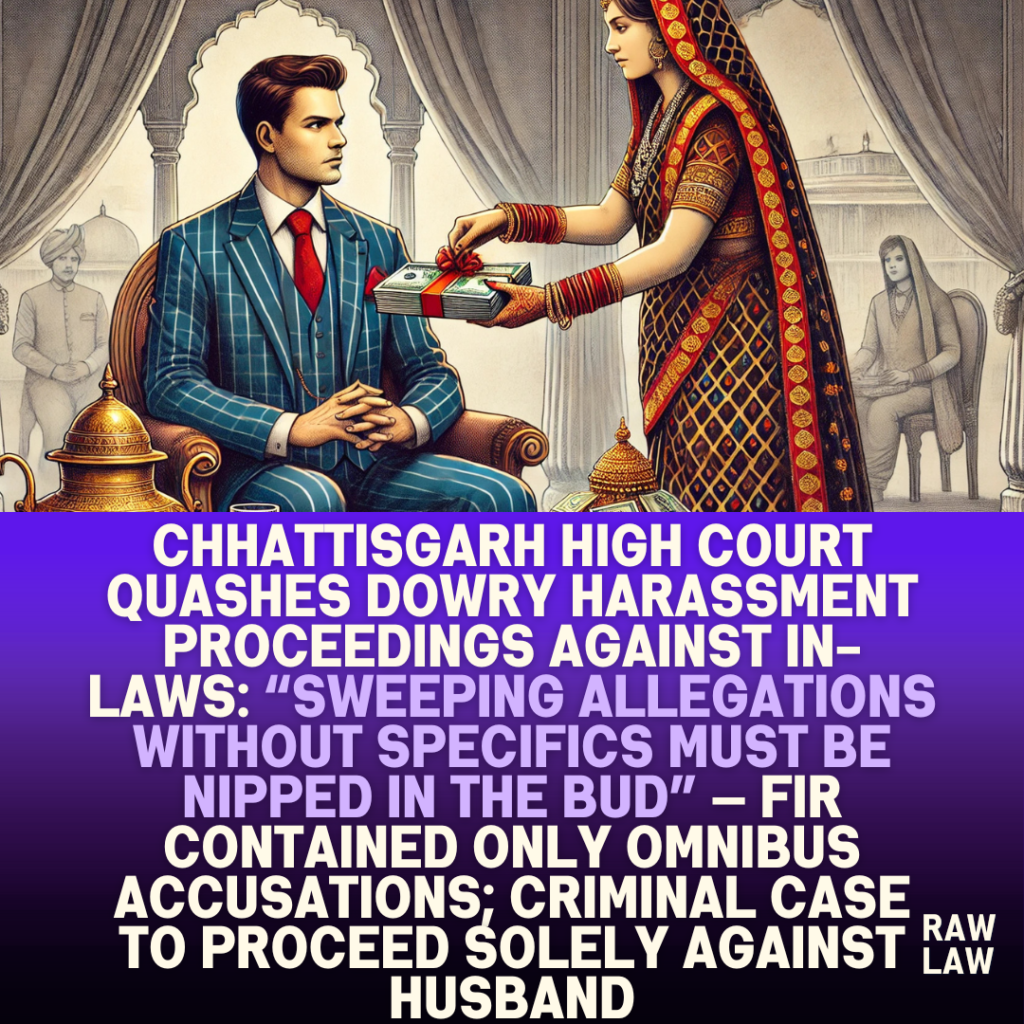Court’s Decision
The Chhattisgarh High Court allowed a petition under Section 482 of the Code of Criminal Procedure, quashing the criminal proceedings under Sections 498A and 34 of the Indian Penal Code against the petitioner-in-laws. The Court found that the FIR contained only “bald and omnibus allegations” without specific details of alleged cruelty. However, the proceedings against the husband were not quashed and were allowed to continue.
“Prima facie no offence under Section 498A/34 of the IPC is made out… only bald and omnibus allegations have been made,” the Court observed.
Facts
The case arose out of a matrimonial dispute. The marriage between the complainant (Respondent No. 2) and Petitioner No. 1 was solemnized in 2018 according to Muslim customs. A child was born out of the wedlock. Subsequently, the complainant left her matrimonial home and filed a complaint alleging dowry demand and cruelty by her husband and in-laws. An FIR was registered in February 2024 under Sections 498A and 34 of the Indian Penal Code. Mediation was attempted but failed.
Issues
- Whether general and unspecific allegations in a matrimonial dispute are sufficient to sustain prosecution under Sections 498A and 34 IPC?
- Whether the FIR and charge sheet filed against the in-laws deserve to be quashed for lack of specific allegations?
Petitioner’s Arguments
Counsel for the petitioners argued that the FIR and subsequent charge sheet contained no specific instances or dates of cruelty attributable to the in-laws (Petitioners No. 2 to 5). The complaint merely listed all family members as co-accused without clear, particularized accusations. They relied on several Supreme Court judgments that warn against the misuse of Section 498A IPC to rope in distant or uninvolved family members through omnibus allegations.
Respondent’s Arguments
Counsel for the complainant emphasized that a complaint was filed after failed mediation, and prosecution against the accused was necessary. It was not denied that the allegations were general in nature, but they were said to be reflective of real grievances in the matrimonial relationship. The State supported the continuation of prosecution, arguing that issues of truth and falsehood should be tested at trial.
Analysis of the Law
The Court reiterated that criminal law should not be used as a tool of oppression and harassment. Relying heavily on judicial precedent, the Bench emphasized that vague and generalized allegations without any concrete evidence do not constitute a prima facie case under Section 498A IPC. When no specific acts of cruelty or harassment are alleged with dates, places, and context, such complaints cannot be allowed to proceed.
The judgment also reaffirmed that Section 498A was enacted to combat real and systemic cruelty against women but has in some cases been misused as a retaliatory tactic, especially during ongoing matrimonial disputes.
Precedent Analysis
The Court relied on several Supreme Court decisions including:
- Geeta Mehrotra v. State of Uttar Pradesh (2012)
– Held that mere casual reference to family members in the FIR without specific allegations does not justify prosecution under Section 498A IPC. - K. Subba Rao v. State of Telangana (2018)
– Emphasized that courts must exercise caution in proceeding against distant relatives unless specific allegations are made. - Rashmi Chopra v. State of Uttar Pradesh (2019)
– Held that judicial process should not be converted into an instrument of harassment and must be used with solemnity. - Dara Lakshmi Narayan v. State of Telangana (2024)
– Reiterated that sweeping allegations without concrete evidence against in-laws living separately constitute abuse of legal process. - Bhajan Lal (1992) – The foundational judgment outlining the parameters for quashing criminal proceedings in appropriate cases.
Court’s Reasoning
The Court noted that:
- The FIR only made generic allegations such as demand of cash and cruelty by all in-laws.
- No specific roles, incidents, or details regarding date and place were provided against the in-laws.
- Such sweeping and omnibus allegations are not sufficient to prosecute individuals under Section 498A IPC.
- The Apex Court has consistently warned against misuse of this provision and has laid down guidelines in multiple decisions.
Consequently, the High Court observed that allowing the case to proceed against the in-laws would amount to misuse of the judicial process.
Conclusion
The Court quashed the criminal case pending before the Judicial Magistrate First Class, Raipur, only to the extent of Petitioners No. 2 to 5—the in-laws. However, the criminal case shall continue against Petitioner No. 1, i.e., the husband.
“The concerned trial court shall decide criminal case pending against the husband strictly in accordance with law without being influenced by any of the observations made hereinabove,” the Bench clarified.
Implications
- The ruling reinforces the Supreme Court’s stance against implicating entire families in Section 498A IPC cases without specific evidence.
- It is a caution to complainants and police authorities to scrutinize FIRs to prevent misuse.
- Matrimonial disputes must be carefully examined to avoid turning them into tools of vengeance or harassment.
FAQs
Q1. Can a court quash a Section 498A case against in-laws without trial?
Yes, if the complaint contains only vague and general allegations without specific acts of cruelty attributed to the in-laws, courts can exercise inherent powers under Section 482 CrPC to quash the proceedings.
Q2. What role does the Supreme Court’s Bhajan Lal judgment play in quashing FIRs?
The Bhajan Lal case laid down illustrative categories where courts can quash criminal proceedings, especially when allegations are absurd, vague, or abuse the legal process.
Q3. Does the continuation of criminal proceedings against the husband affect the quashing against in-laws?
No, courts can allow prosecution to continue against the husband while quashing it against other family members if no specific allegations are made against them.
Also Read: Gujarat High Court Quashes Preventive Detention Order Against Alleged Repeat Offender



